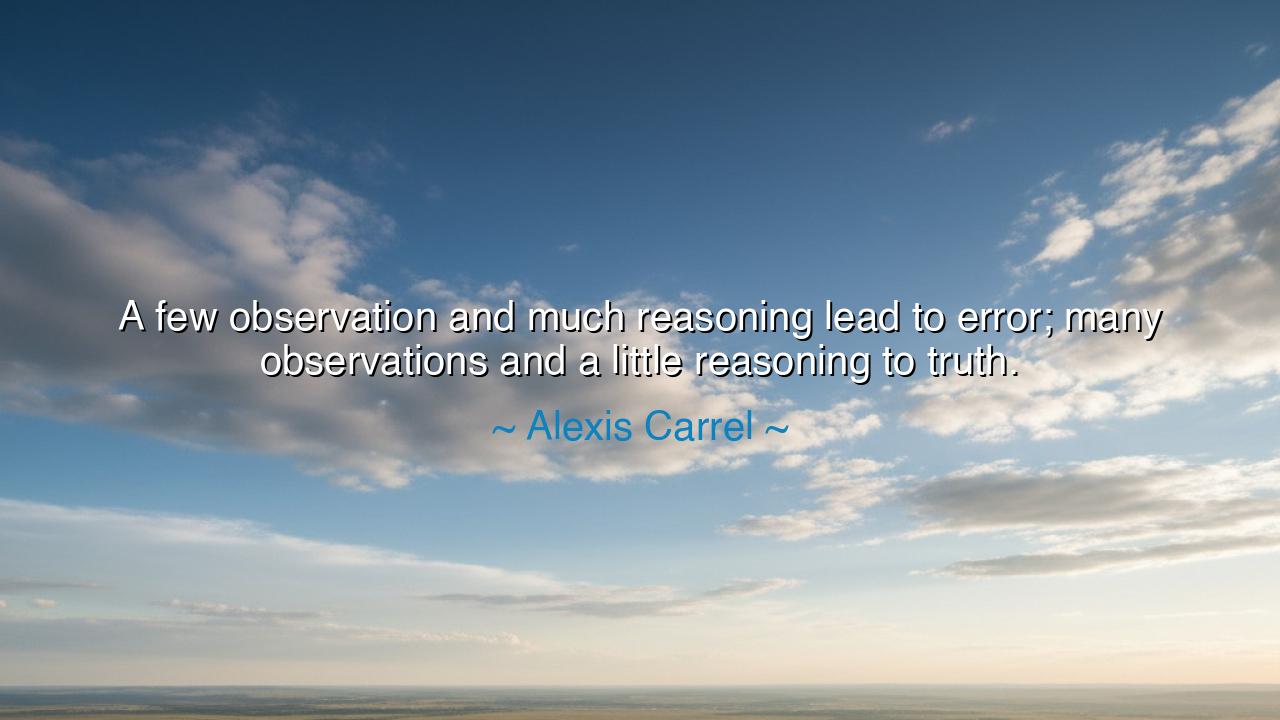
A few observation and much reasoning lead to error; many
A few observation and much reasoning lead to error; many observations and a little reasoning to truth.






Hear, O children of inquiry and seekers of wisdom, the voice of Alexis Carrel, physician and philosopher, who spoke these enduring words: “A few observations and much reasoning lead to error; many observations and a little reasoning to truth.” In this teaching lies a stern warning and a guiding light: that man must not build castles of logic upon scant foundations, for such towers will crumble into dust. Only through the patient gathering of observations, through the humble listening to the world itself, may we approach the dwelling place of truth.
Carrel, born a surgeon and later a thinker upon the nature of life, knew this lesson through practice. In the world of medicine, haste in judgment can kill, but careful observation of the body—its symptoms, its rhythms, its secrets—can heal. He had seen men of great intellect reason themselves into error when they lacked sufficient evidence. He had also seen humble practitioners, who by long observation and a simple clarity of thought, arrive closer to truth than their more arrogant peers. Thus he proclaimed: reasoning is not to be abandoned, but it must be guided by the light of abundant evidence.
Consider the ancients who gazed upon the heavens. The philosophers of old, with a few observations of the stars, crafted elaborate theories of crystal spheres and celestial music. Their reasoning was ingenious, but it wandered far from reality. Centuries later, Tycho Brahe devoted his life to many observations, measuring the skies with tireless discipline. Upon his mountain of evidence, Johannes Kepler applied modest reasoning, and out of this union was born the truth of elliptical orbits. Here is Carrel’s wisdom revealed in history: abundance of observation, joined to humility of reasoning, yields the fruit of discovery.
This truth is also seen in the realm of human affairs. How often do men, with but a few impressions of others, rush into judgment! They reason much upon little, and so they err, misjudging hearts and poisoning relationships. But the one who observes carefully—listening long, watching patiently, discerning with care—will arrive at a truer understanding of his fellow man. Thus, in life as in science, Carrel’s words ring true: gather first, reason later; for patience is the mother of clarity.
There is a tale from the world of exploration. When Christopher Columbus first touched the shores of the New World, he saw only a glimpse of the land and people. From a few observations, he reasoned grandly that he had reached Asia. His error endured for years, clouding maps and minds. Yet later explorers, who made many observations, slowly charted coastlines, studied peoples, and understood that a new continent had been found. Their reasoning, modest and guided by evidence, led them closer to truth. Here again, haste in thought and poverty of observation gave birth to error, while patience yielded discovery.
So, my children, take this wisdom into your own hearts: do not be quick to reason where your knowledge is thin. Gather first, watch first, learn first. Let your eyes and ears be wide open, and let your conclusions be slow and cautious. For the danger of man is not that he thinks too little, but that he thinks too quickly upon too little.
In your daily life, practice this art. When you face a conflict, do not judge on first sight, but observe deeply before you decide. When you seek knowledge, do not leap to grand theories after scant reading, but gather many sources and listen to many voices. When you walk in the world, let patience guide you more than haste. For as Carrel has taught us, many observations and a little reasoning lead to truth, but scant observation and much reasoning will only cast you into error.
Thus, let your mind be both sharp and humble. Do not despise reasoning, but ground it in the solid soil of reality. And remember always: truth does not reveal herself to the hasty, but to the patient; not to the arrogant, but to the humble observer who waits, watches, and in the fullness of time, understands.






AAdministratorAdministrator
Welcome, honored guests. Please leave a comment, we will respond soon